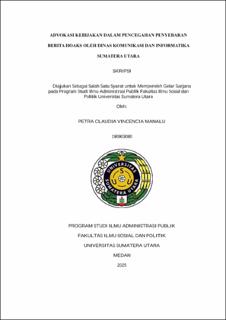| dc.description.abstract | The spread of hoaxes has become a serious challenge in the digital era,
particularly in shaping public opinion and threatening social stability. The
widespread dissemination of hoax news in North Sumatera indicates that efforts to
prevent the spread of misinformation in the region have not been caried out
optimally. One way to advocate for the rights and justice of hoax victims is
through policy advocacy. Policy advocacy emphasizes the importance of
understanding the policymaking process, the actors involved, and the methods
used to mobilize support in order to drive policy change that prioritizes public
interests.
This study employs a descriptive qualitative method, with data collected
through interviews, field observations, and analysis of relevant documents. The
informants in this research consist of government officials directly involved in the
implementation of policy advocacy in the field of public information and
communication oversight. The analysis is based on the six dimensions of the
Johns Hopkins University policy advocacy framework: analysis, strategy,
mobilization, action, evaluation, and sustainability.
This research aims to analyze how policy advocacy is conducted by the
Department of Communication and Informatics of North Sumatra Province in
their efforts to prevent the spread of hoaxes. The findings reveal that current
advocacy practices face various challenges, including the absence of specific
local. The research aims to analyze how policy advocacy is conducted by the
Dapertement of Communication and Informatics of North Sumatra Province in
their efforts to prevent the spread of hoaxes. The findings reveal that current
advocacy practices face various challenges, including the absence of specific
local regulations addressing hoax prevention, limited human resources,
inadequate digital infrastructure, insufficient funding for monitoring and digital
literacy initiatives, lack of coordination among stakeholders, and low levels of
digital literacy among the public. The study recommends strengthening local
regulations, enchancing the capacity of civil servants, integrating digital literacy
into the education system, establishing date-based evaluation mechanism, and
fostering multi-stakeholder collaboration to produce participatory, contextual,
and sustainable public policies. | en_US |


